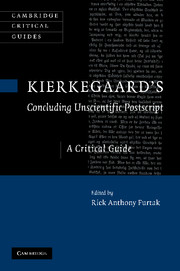Book contents
- Frontmatter
- Contents
- List of contributors
- Acknowledgments
- List of abbreviations
- Introduction
- 1 The “Socratic secret”: the postscript to the Philosophical Crumbs
- 2 Kierkegaard's Socratic pseudonym: A profile of Johannes Climacus
- 3 Johannes Climacus' revocation
- 4 From the garden of the dead: Climacus on interpersonal inwardness
- 5 The Kierkegaardian ideal of “essential knowing” and the scandal of modern philosophy
- 6 Lessing and Socrates in Kierkegaard's Postscript
- 7 Climacus on subjectivity and the system
- 8 Humor and irony in the Postscript
- 9 Climacus on the task of becoming a Christian
- 10 The epistemology of the Postscript
- 11 Faith and reason in Kierkegaard's Concluding Unscientific Postscript
- 12 Making Christianity difficult: The “existentialist theology” of Kierkegaard's Postscript
- Bibliography
- Index
9 - Climacus on the task of becoming a Christian
Published online by Cambridge University Press: 04 August 2010
- Frontmatter
- Contents
- List of contributors
- Acknowledgments
- List of abbreviations
- Introduction
- 1 The “Socratic secret”: the postscript to the Philosophical Crumbs
- 2 Kierkegaard's Socratic pseudonym: A profile of Johannes Climacus
- 3 Johannes Climacus' revocation
- 4 From the garden of the dead: Climacus on interpersonal inwardness
- 5 The Kierkegaardian ideal of “essential knowing” and the scandal of modern philosophy
- 6 Lessing and Socrates in Kierkegaard's Postscript
- 7 Climacus on subjectivity and the system
- 8 Humor and irony in the Postscript
- 9 Climacus on the task of becoming a Christian
- 10 The epistemology of the Postscript
- 11 Faith and reason in Kierkegaard's Concluding Unscientific Postscript
- 12 Making Christianity difficult: The “existentialist theology” of Kierkegaard's Postscript
- Bibliography
- Index
Summary
“the simplest task is the most difficult …”
Kierkegaard is a thinker of movement, of becoming. The loquacious writer of Concluding Unscientific Postscript never digresses from the subject labeled “the task of becoming a Christian” – a deceptively simple phrase that stands for a whole philosophy of movement, drawing on and distilling elements from Kierkegaard's earlier pseudonymous texts. The Postscript's supposed author Johannes Climacus praises the constancy of “repetition's ever-deepening absorption in the one thought,” and the philosophical preoccupation of Kierkegaard's whole authorship is the thought – or, rather, the question – of becoming. To this question belong the concepts of task, decision, transition, leap, kinêsis, striving, and repetition that are employed in Climacus' elucidation of how Christianity is appropriated and practiced. The proliferation of these figures of movement throughout the Postscript reflects the pseudonym's insistence that “existence without motion is unthinkable” (CUP 258); that the human being “is constantly coming to be” (CUP 77). The purpose of this chapter is to draw the reader's attention to the various configurations of the question of becoming within the text, and to illuminate their provenance and philosophical significance. Most particularly, this analysis of the theme of movement will help us to make sense of the dialectic of immanence and transcendence which runs through the Postscript.
Climacus' discussion of the task of becoming a Christian focuses on “how” rather than “what”: on the existential form rather than the intellectual content of Christian belief.
Keywords
- Type
- Chapter
- Information
- Kierkegaard's 'Concluding Unscientific Postscript'A Critical Guide, pp. 170 - 189Publisher: Cambridge University PressPrint publication year: 2010
- 1
- Cited by

